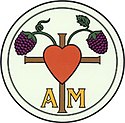
Back Schwarzenau Brethren Danish Schwarzenauer Brüder German Schwarzenauer Brüder Dutch Dunkers Portuguese Данкеры Russian Brethren World Assembly Swedish Брати Шварценау Ukrainian
| Part of a series on the |
| Schwarzenau Brethren (the German Baptists or Dunkers) |
|---|
 |
| Background |
| Doctrinal tenets |
| People |
| Groups |
Defunct groups |
| Related movements |
| Part of a series on |
| Anabaptism |
|---|
 |
|
|
The Schwarzenau Brethren, the German Baptist Brethren, Dunkers, Dunkards, Tunkers,[1] or sometimes simply called the German Baptists, are an Anabaptist group that dissented from Roman Catholic, Lutheran and Reformed European state churches during the 17th and 18th centuries. German Baptist Brethren emerged in some German-speaking states in western and southwestern parts of the Holy Roman Empire as a result of the Radical Pietist revival movement of the late 17th and early 18th centuries.
Hopeful of the imminent return of Christ and desiring to follow Jesus in their daily life, the founding Brethren abandoned State churches and officially formed a new church in 1708. They thereby attempted to translate the New Testament idea of brotherly love into concrete congregational ordinances for all the members.[2] The Brethren rejected some Radical Pietists’ focus on emotionalism and direct revelation, and emphasized early ("Apostolic" or "primitive") New Testament Christianity as the binding standard for congregational practices. The founding Schwarzenau Brethren were also in fellowship with other Anabaptists, such as the Mennonites, and influenced by their writings.
As with many other Anabaptist traditions, the Schwarzenau Brethren are divided into Old Order groups (such as the Old Brethren German Baptist) that practice a lifestyle without certain elements of modern technology, Conservative groups (such as the Dunkard Brethren Church) that preserve traditional theological distinctives while allowing for the usage of modern conveniences, and mainline groups (such as the Church of the Brethren) that are assimilated in society.[3]
In German-speaking Europe, the Brethren became known as Neue Täufer (New Baptists), in distinction from the older English Baptist groups with which they had no formal ties. In the United States, they became popularly known as "Dunkers", "Dunkards", or "Tunkers", terms that stem from the German verb tunken (Pennsylvania German: dunke), 'to dip, to immerse'.
- ^ One or more of the preceding sentences incorporates text from a publication now in the public domain: Chisholm, Hugh, ed. (1911). "German Baptist Brethren". Encyclopædia Britannica. Vol. 11 (11th ed.). Cambridge University Press. pp. 769–770.
- ^ Meier, Marcus (2008). The Origin of the Schwarzenau Brethren. Philadelphia: Brethren Encyclopedia, Inc. p. 144.
- ^ Cite error: The named reference
Bronner2015was invoked but never defined (see the help page).
© MMXXIII Rich X Search. We shall prevail. All rights reserved. Rich X Search